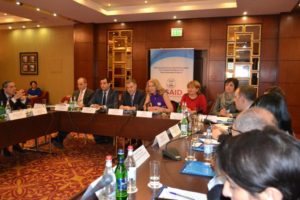 On November 9, the USAID Advanced Science and Partnerships for Integrated Resource Development Project (ASPIRED) organized the policy workshop to discuss the current situation with the groundwater resources in the Ararat Valley. The USAID Mission Director Deborah Grieser, the Minister, Chief of Staff Davit Harutyunyan, the Deputy-Ministers of Nature Protection, Agriculture, Energy Infrastructures and Natural Resources, other decision-makers, public and private sector representatives attended the event. In her opening remarks, the USAID Mission Director Deborah Grieser thanked the Government of Armenia and the stakeholders for continued partnership and commitment to promote water sector reforms and sustainable water management practices in Armenia. The Deputy Minister of Nature Protection Khachik Hakobyan emphasized that conservation of the groundwater resources of the Ararat Valley has strategic importance for the country and is among the priority issues the Government is tasked with.
On November 9, the USAID Advanced Science and Partnerships for Integrated Resource Development Project (ASPIRED) organized the policy workshop to discuss the current situation with the groundwater resources in the Ararat Valley. The USAID Mission Director Deborah Grieser, the Minister, Chief of Staff Davit Harutyunyan, the Deputy-Ministers of Nature Protection, Agriculture, Energy Infrastructures and Natural Resources, other decision-makers, public and private sector representatives attended the event. In her opening remarks, the USAID Mission Director Deborah Grieser thanked the Government of Armenia and the stakeholders for continued partnership and commitment to promote water sector reforms and sustainable water management practices in Armenia. The Deputy Minister of Nature Protection Khachik Hakobyan emphasized that conservation of the groundwater resources of the Ararat Valley has strategic importance for the country and is among the priority issues the Government is tasked with.
The situation with the groundwater resources in the Ararat Valley has been a topic of public discourse for the last couple of years. The field studies showed the artesian zone of the Ararat Valley has shrunk and the groundwater level in the Ararat Valley decreased significantly over the last decade due to uncontrolled use of groundwater in the area, primarily by fish farms. The decreasing level of the groundwater prevented the local communities from access to irrigation and drinking water. Majority of the communities interviewed by the ASPIRED Project in Ararat and Armavir marzes complained that water shortage has been quite significant over recent years.
During the policy meeting, the ASPIRED Project presented the Report “Achieving Sustainable Use of Groundwater in the Ararat Valley: the Role of the Fisheries Sector” – a comprehensive study, where the issue of the groundwater use in the Ararat Valley has been analyzed from different perspectives, the resource conservation needs, the economic analysis of the fish farming sector and its trends, the impact of fisheries on the local rural communities, and the mitigation measures.
The ASPIRED Project addressed the consequences of uncontrolled water abstraction by fisheries and its implications on the groundwater availability in the Ararat Valley, and recommended a set of policy, administrative and economic mechanisms aiming to mitigate the situation. Proposed measures include compliance monitoring of the water use permits conditions, the adoption of increasing block pricing structure, encouraging a more sound use of groundwater resources by means of modern water saving technologies, and liquidation of abandoned wells that have flows.
The changes in the water fees alone will not result in sustainable use of water in the Valley. There is a need for the new prudent water sector management policy in the Ararat Valley and enhancement of the water use data transparency and reliability. For example, online monitoring system will allow for a real-time groundwater use tracking in the fisheries of the Ararat Valley. Thus, the possibility of corruption, fraud and over abstraction of water by some irresponsible players will be minimized. The water resource conservation objectives are best achieved when the systemic approach is implemented to resource management using a combination of policy, control and economic instruments.
